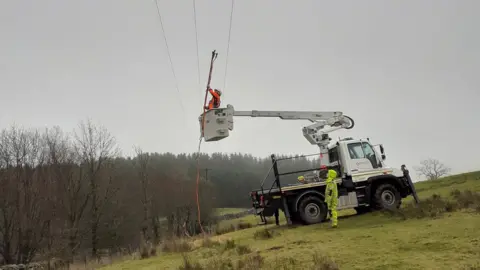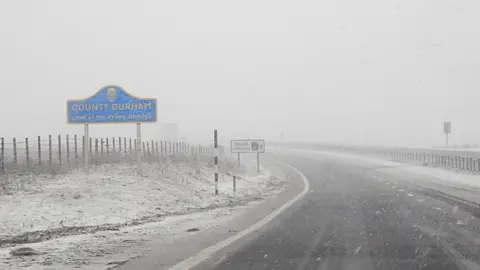Storm Arwen: Power restored to all homes after 12 days
 MOD
MODThe remaining homes and businesses without power in the north-east of England have had supplies restored, 12 days after Storm Arwen.
Northern Powergrid said electricity was now back on in all 240,000 properties affected by damage caused by the "worst storm in over 20 years".
There were concerns Storm Barra could hamper progress and cause further damage to buildings and trees.
Two streets in Blyth, Northumberland, are closed because of unsafe buildings.
There were also power cuts in some areas on Tuesday but no major damage has been reported.
But people in some communities in County Durham and Northumberland are still relying on back-up generators.
Northern Powergrid says the extent of the damage from Storm Arwen will take them well into the new year to fix, and generators will be removed once permanent repairs are made.
The energy distributor thanked people for their patience and apologised for the disruption and delays.
It said the experience had "taught us that there are areas where we need to improve", with particular emphasis on "the way we use our systems to communicate with you in the event of major power cuts".
"We have already made some changes and will learn more lessons from the reviews that will follow," it added.
Emergency measure
The Army was brought in last week but troops are set to leave County Durham on Wednesday after helping to support communities.
The county council asked for the emergency measure to be extended until Wednesday while some homes remained without power.
Storm Arwen caused major damage when it hit the area on 26 November, with parts of Northumberland and County Durham worst affected.
 PA Media
PA MediaBoth county councils declared major incidents with overhead lines brought down in the storm.
Power was originally set to be restored "by the end of" last week, with Prime Minister Boris Johnson saying on Monday he had received assurances from Northern Powergrid that supplies would be restored by the end of Tuesday.
The company said with all homes now reconnected, it would "move quickly" to make compensation payments for those without power for more than two days, with thousands expected to make claims.
"We understand the strain this has placed on our customers at a difficult time," it said.

'We seemed forgotten'
Mary Laycock and her husband Terry, who live in a small hamlet near Wooler, Northumberland, at the foot of the Cheviot Hills, were among the last people to have their power restored on Tuesday.
"I don't think they knew we existed. We just seemed to be forgotten about. There are only five houses occupied here.
"The mountain rescue team from Wooler came to see us and the police also came round with leaflets to say where we could go and get a free hot meal.
"I have been cooking on two gas canisters and we have also been to Wooler to get fish and chips. I think I have lost everything in the freezer but at least my daughter took the Christmas turkey back to hers.
"We have had candles all along the mantlepiece and sat and talked a lot at night. We have coped as best we could. We are country people and just get on with it.
"We are not used to having any luxury but we do like to have light at least, and with no TV we don't know what's been happening in the outside world. It has been jolly cold but we just put a good thick duvet on the bed.
"We could have moved out but we have a coal fire and being British - especially Northumbrians - we stuck it out."

John Charlton, a Northern Powergrid engineer, was working near Wooler on Tuesday and said he had seen nothing like the chaos of the last week.
"It's been very tiring - all the lads are very tired now," he told BBC Radio Newcastle.
"We've been doing long 16-hour days, with just eight hours off. Everyone has really dug in deep and done their bit to get everyone back on supply as best we can."
 Electricity North West
Electricity North WestRural areas like Medomsley, in County Durham, are currently relying on generators, which have failed periodically before coming back on.
Christine Johnston, the head teacher of Bishop Ian Ramsey Primary School in the village, said the school had been closed for the past two days, although it reopened on Wednesday.
"It's heart-breaking when you can't do all the nice things at this time of year for the children to enjoy themselves in preparation for Christmas, because of something that is out of our control," she told BBC Radio Newcastle.
"We need that permanent solution of being back on the grid where it is more reliable, or we need a generator for the school so we can not only provide a solution for the children's education but facilities and a hub for the whole community."
Financial implications
Durham County Council has urged people to continue to contact them if they need additional support, even if their power has now been restored.
"While we are pleased that supply has now been reinstated for the vast majority of residents, we know that the impact of the outages will last for some time," said chief executive John Hewitt.
"Whether that's the financial implications or practical ones, we want people to know that the support we have been providing will continue for as long as they need it."
 Durham County Council
Durham County CouncilMeanwhile a yellow weather warning for wind following Tuesday's Storm Barra has been lifted for most parts of England, the Met Office has confirmed.
It was not as powerful as Storm Arwen but still caused travel disruption, including LNER services between north-east England and Scotland.
In Cumbria a man and a woman were taken to hospital when a tree reportedly fell on them at Fitz Park in Keswick.
The storm also caused TV signals from the temporary Bilsdale mast in North Yorkshire to cut out for almost an hour before it was restored.
 Campbell Sheppard
Campbell SheppardGlen Sanderson, Northumberland County Council leader, said he had spoken to the prime minister last weekend about the power outage affecting communities, insisting the situation was "simply unacceptable in 2021".
"What we need to have out of this is an inquiry that will establish the issues and will challenge [Northern] Powergrid to ensure the people I represent will never have to go through this again," he added.
The long delays have prompted energy regulator Ofgem to warn it will take enforcement action against network companies that failed to restore power to customers quickly enough.
It has also agreed with firms to lift the £700 cap on compensation that could be offered to those stuck without power.
The change will allow those affected to claim £70 for each 12-hour period they have no electricity, after an initial £70 for the first 48 hours of any cut.

Follow BBC North East & Cumbria on Twitter, Facebook and Instagram. Send your story ideas to [email protected].
